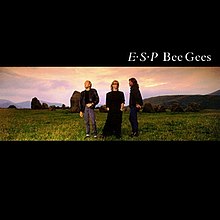E.S.P. (Bee Gees album)
| E.S.P. | ||||
|---|---|---|---|---|
 |
||||
| Studio album by Bee Gees | ||||
| Released | September 1987 | |||
| Recorded | January – March 1987 | |||
| Studio | Middle Ear, Miami Beach and Criteria Studios, Miami, Florida | |||
| Genre | Pop rock, synthpop, adult contemporary | |||
| Length | 48:25 | |||
| Label | Warner Bros. | |||
| Producer | Arif Mardin, Barry Gibb, Robin Gibb, Maurice Gibb, Brian Tench | |||
| Bee Gees chronology | ||||
|
||||
| Singles from E.S.P. | ||||
|
||||
| Professional ratings | |
|---|---|
| Review scores | |
| Source | Rating |
| AllMusic | |
| Los Angeles Times | |
E.S.P. is the seventeenth original album (fifteenth worldwide) by British group Bee Gees. Released in 1987, it was the band's first studio album in six years, and their first release under their new contract with Warner Bros. It marked the first time in twelve years the band had worked with producer Arif Mardin, and was their first album to be recorded digitally. The album sold well in Europe, reaching No. 5 in the UK, No. 2 in Norway and Austria, and No. 1 in Germany and Switzerland, though it barely made the top 100 in the US.
The album's first single, "You Win Again", reached No. 1 in the UK, Ireland, Switzerland, Germany, Austria and Norway.
With the Bee Gees now back in the Warner-Elektra-Atlantic conglomerate, producer Arif Mardin was once again available to work with them.
The Gibb brothers began writing and recording songs for E.S.P. around September 1986. They worked at Maurice's home studio, informally known as Panther House, rather than at Middle Ear. Maurice set everything up and Scott Glasel was effectively the assistant engineer. Scott's recollection years later is that Barry brought in the songs as demos, featuring just his voice and guitar, and that they recorded the fuller demos based on Barry's songs. Scott also recalls Barry and Robin many times arguing heatedly over trivial things and calling off the project, only to have Maurice call Scott a few days later to let him know they were starting again.
Over the previous few years Barry and Robin had become accustomed to different recording styles. Barry preferred to write all the songs and recorded demos, and then go into the big studio with session players to record polished versions for release. Robin instead liked to use the recording sessions themselves to work out the songs. Maurice liked a hands-on approach and where he had a voice in production he either appears prominently on the finished tracks or worked out arrangements with a few session players during recording. The compromise recording method adopted for E.S.P. was for the brothers to start all the recordings themselves and then complete them with session players and a producer. If they started with an idea and a rhythm track, they built a song onto it as they recorded, something that would accommodate what all three preferred to do. The result of this process would then be a demo, with vocals by the three brothers and instrumentals by Maurice and Barry. The drumming was electronic sequencers programmed by Barry and Maurice and their engineer Scott Glasel. The Gibb instrumental tracks were done from October into 1987. The second stage appears to have been recording the main vocal tracks, and where this was done is unknown. The demo of "E.S.P." on the box set Tales from the Brothers Gibb is at this second stage. Lastly, session musicians replaced most of the instrumental parts and the brothers dubbed additional vocals. They also edited some of the tracks, inserted new sections, and sped up at least two of them.
...
Wikipedia
